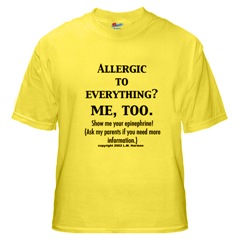Recently a woman joined my eating disorders group who doesn’t have issues with bingeing, purging, restricting, or compulsively overeating. She talked a lot about needing to diet… and about her weight being everyone else’s fault. She gained weight because she moved to the South and everyone is lazier than in the North. She gained weight because her boyfriend buys junk food. But, her biggest problem? Food allergies. She is allergic to everything. Including:
- Fish (she can’t even be in rooms where fish was cooked 3 days prior. Unless it’s tuna fish… and she can eat shrimp)
- Cat dander (dog dander is fine, though)
- All legumes
- Nuts
- Latex
- Some dairy
…and I don’t remember the rest of it. In her words, “the only thing I am NOT allergic to is junk food.” Hmm. Anyway, all I could think was, “Who admitted her to this group! Why is she here?”
 And the more she talked, the more I realized that her food allergies are, well, crazy. She has just recently acquired them… so recently, in fact, that she doesn’t even know all that she’s allergic to — it’s always changing. She doesn’t trust the medical tests because they yield different answers. The whole situation sounds very bizarre to me. There are people who are allergic to everything, legitimately, but this woman’s symptoms and allergies just didn’t make any sense.
And the more she talked, the more I realized that her food allergies are, well, crazy. She has just recently acquired them… so recently, in fact, that she doesn’t even know all that she’s allergic to — it’s always changing. She doesn’t trust the medical tests because they yield different answers. The whole situation sounds very bizarre to me. There are people who are allergic to everything, legitimately, but this woman’s symptoms and allergies just didn’t make any sense.
So why is she in an eating disorder group? My guess is that she has been to 100 allergists that don’t know what is wrong with her and can’t find any explanation for her bizarre and inconsistent symptoms. One of these doctors probably decided that it was psychosomatic… and hey, it’s an eating issue, so she should be treated at a facility that specializes in eating disorders — right?
Clearly I think “no,” but before I get to that, a few notes about food allergies. There is most definitely a connection between the emotional, mental, and neural/biological components that comprise allergic reactions. These clips are from an article, “Some Psychosomatic Aspects of Food Allergy” (notice that this article is 55 years old… still, it’s interesting, and you can read the full text online!)
“Food habits are conditioned patterns of behavior. Some people get emotionally or allergically sick from eating certain untainted foods. Sometimes the cause of such illness is obvious; more often, the cause is unsuspected, and certainly not readily established as food-induced.”
“Foods become endowed with various dynamic emotional meanings according to the person’s upbringing, cultural and religious training, and personal life experiences. The most common untoward idiosyncratic psychosomatic reactions to food include nausea, vomiting, epigastric discomfort or pain, intestinal cramps, aerophagia, belching, and rarely diarrhea — all being part of the riddance reaction. The symbolic supportive values of certain foods are such that a person may overeat these foods when he is subjected to unusual emotional stresses.”
“In the variable food allergy, tolerance for a given food may vary so that at some times small amounts of the offending food will cause an allergic reaction. But at other times the amount of this food which must be ingested to cause an allergic reaction may be very much greater than any amount that the patient would ordinarily eat.”
I agree that there are probably psychological issues underlying her food intolerances… which does make it sound like an eating disorder. However, I think that she has somatization disorder — not an eating disorder.
Somatization Disorder: Individuals with somatization disorder claim to suffer constantly and for many years from many physical illnesses, yet they do not have any specific, diagnosed medical illnesses that can explain their symptoms. Still, these symptoms cause distress and negatively affect the individual’s ability to function day-to-day.
I think there is an inherently different mindset between someone with an eating disorder and someone with a psychosomatic food allergy. In the case of the later, the individual believes that he/she is biologically ill. She has some sickness that is making her ill. In the case of an eating disorder, I think there’s a lot more shame, self-punishment, control, guilt, etc. involved. This woman doesn’t have an Ed voice. That’s going to be my new criteria for having an eating disorder: the presence of Ed. Because as much as I dislike referring to the disorder / negative voice / whatever as “Ed,” there is no confusion over what I’m talking about. If you have an eating disorder, you know.
So, my conclusion? Psychosomatic food allergies are not eating disorders. They are a type of somatization disorder… and therefore should not be treated at an eating disorder facility (at least not in a group setting).

